The Strange Journey of Alice Pendelbury Read online
PRAISE FOR THE STRANGE JOURNEY OF ALICE PENDELBURY
“One of Marc Levy’s best novels to date.”
—Mohammed Aïssaoui, Le Figaro
“Another success for Marc Levy.”
—L’Express
“Levy is always great at surprising readers with twists and turns in his stories . . . The journey is enjoyable and leads to many smiles.”
—Le Parisien
“Once again, Marc Levy reveals his talent at telling stories.”
—Le Parisien
“The Strange Journey of Alice Pendelbury is full of poetry and full of soul. In this funny and endearing novel, the author continues to weave through the themes he so enjoys—the intersection between friendship and romance, humility and courage, the true love of others and self-fulfillment.”
—Le Matin
“A fine-tuned, well-executed intrigue, which moves at a good pace. Full of humor and humanity, it raises questions about identity, about one’s story and past. A book full of poetry, about the quest for true happiness.”
—L’Union
“One of Marc Levy’s best novels to date, and a great success. I loved the parts about friendship between a man and woman, and thoroughly enjoyed Mr. Daldry’s take on love. All readers will dream of going to Istanbul with Mr. Daldry . . . A lovely book that takes the reader on an enthralling journey.”
—Sophie Davant, C’est au programme TV show, France 2
“We all fell in love with Mr. Daldry, and we want the same man at home! . . . We turned the pages holding our breath until the very end! . . . Dialogue, humor, suspense: it’s all there!”
—Aufeminin.com
“This is a book that has a philosophical dimension: it’s about appearances, about who we think we are, about what we think we know. Ultimately, it all depends on how we perceive things.”
—Aymeric Caron, Europe 1
ALSO BY MARC LEVY
If Only It Were True
Seven Days for an Eternity
Children of Freedom
The Last of the Stanfields
The Shadow Thief
The Strange Journey of Alice Pendelbury
Replay
P.S. from Paris
This is a work of fiction. Names, characters, organizations, places, events, and incidents are either products of the author’s imagination or are used fictitiously.
Text copyright © 2011 Marc Levy
Translation copyright © 2019 Chris Murray
All rights reserved.
No part of this book may be reproduced, or stored in a retrieval system, or transmitted in any form or by any means, electronic, mechanical, photocopying, recording, or otherwise, without express written permission of the publisher.
Previously published as L’Étrange voyage de Monsieur Daldry by Robert Laffont in 2011 in France. Translated from French by Chris Murray. First published in English by AmazonCrossing in 2019.
Published by AmazonCrossing, Seattle
www.apub.com
Amazon, the Amazon logo, and AmazonCrossing are trademarks of Amazon.com, Inc., or its affiliates.
ISBN-13: 9781542040563
ISBN-10: 1542040566
Cover design by Kimberly Glyder
To Pauline
To Louis
To Georges
CONTENTS
START READING
PROLOGUE
1
2
3
4
5
6
7
8
9
10
11
12
13
14
15
16
17
Epilogue
ACKNOWLEDGMENTS
ABOUT THE AUTHOR
ABOUT THE TRANSLATOR
“Predictions are difficult to make, particularly when they concern the future.”
—Pierre Dac
PROLOGUE
“I never believed that I had a particular destiny, or that signs in my life were guiding me toward a path I ought to take. I didn’t believe in fortune-tellers or tarot cards. I just believed in simple coincidence and in the significance of chance happenings.”
“Why did you come on such a long journey if you didn’t believe in those things?”
“Because of a piano.”
“A piano?”
“It was out of tune, like the old dance hall pianos that used to end up in army barracks, but there was something about it—or at least, something about the person playing it.”
“Who was it?”
“My neighbor across the corridor. At least I think it was. I’m not entirely certain.”
“You’re here tonight because your neighbor was playing the piano?”
“You could put it that way. When I heard the music echoing up the staircase, I felt as though my solitude had been set to music. I wanted to escape it so badly that I agreed to go to Brighton.”
“You will have to start again and tell me the story from the beginning. I think I’ll understand better if you go in order.”
“It’s a long story.”
“There’s no hurry. The wind is blowing in from the sea. It’s raining. I won’t set sail for another two or three days. Let me make us some tea, and you can tell me everything. But you have to promise not to leave anything out. If what you say is true, if we’re really going to be tied to each other for the rest of our lives, I need to know why.”
He knelt before the cast-iron stove, opened the door in its belly, and blew on the coals.
The house was as modest as the rest of his life. Four walls, a single room, a simple roof. Worn plank floors, a bed, and a basin beneath an old spigot where the water ran icy cold in the winter and warm in the summer. There was only one window, but it had a majestic view of the Bosporus. From the table where Alice was sitting, she could see ships sailing through the strait, and beyond them, the European shore.
She took a sip of the tea he had served her and began telling her story.
1
Friday, December 22, 1950
A heavy winter rain drummed on the skylight above the bed. The war had ended only five years ago, and most of London’s neighborhoods were still scarred from the Blitz. Fewer products were rationed now. Although it had been a few years since the war ended, it was recent enough to serve as a reminder of the days when almost everything was rationed.
Alice was spending the evening at home with her motley group of friends. Carol had been an army nurse and now worked at St Bartholomew’s Hospital. The three men were aspiring jazz musicians. Sam was an excellent bassist and sold books at Harrington & Sons; Anton played the trumpet like nobody else could but worked as a carpenter; Eddy scraped by singing for coins at Victoria station and in pubs (when they would let him, that is).
It was Eddy who suggested that they should celebrate the coming of Christmas by taking a trip to Brighton the following day. The amusement park on the pier was open again, and the carnival would be at its best on the Saturday before the holiday.
They each counted up what little they had. Eddy had earned some money in a bar in Notting Hill. Anton had received a modest year-end bonus from his boss. Carol didn’t have a penny, but then she never did, and her friends were used to paying for her. Sam had just sold an American woman a first edition of The Voyage Out and a second edition of Mrs Dalloway, which had been enough to make a week’s wages in a single day. Alice had worked hard the entire year. She had some savings and felt she deserved to spend them. Besides, she could rationalize the expense to spend time with her friends and escape the solitude of her flat.
The w
ine Anton had brought was corked and tasted like vinegar, but they had all drunk enough of it to start singing. They got louder with each song, until Mr. Daldry, Alice’s grouchy neighbor across the landing, came and knocked on the door. Sam was the only one brave enough to answer. He promised the noise would stop immediately, as it was time for everyone to go home anyway. Mr. Daldry accepted their apology, but not before haughtily insisting that he was trying to get some sleep. The Victorian house they lived in had no business turning into an amateur jazz club. It was already unpleasant enough to have to overhear every word of their conversations through the paper-thin walls.
Alice’s friends packed up to go. They promised to meet up at Victoria station for the ten o’clock train to Brighton the next morning. Once they had left, Alice tidied up the room that, depending on the time of day, served as her workplace, dining room, and bedroom. She was just turning down the bedspread when she stood and looked indignantly toward Mr. Daldry’s flat. Where did he get the nerve to break up such a lovely evening? What right did he have to interfere? She put on a shawl, and then took it off, deciding it made her look too motherly. She went and knocked on Mr. Daldry’s door and waited, hands on her hips.
“Please tell me the house is on fire and you’ve come to save me from the flames,” he said sarcastically when he finally came to the door.
“First of all, eleven is not that late on a Friday night, and second of all, I put up with your blasted scales often enough for you to tolerate a little noise on the rare occasions I have some friends over.”
“Your noisy friends are here every week, and they have a regrettable habit of mixing song and drink. It affects my sleep.” He raised an eyebrow to underline this last point before continuing. “And I’m not the one with the piano. Maybe it’s the woman downstairs. I’m a painter, not a musician. If you only knew how quiet this house was before you arrived.”
“What exactly do you paint, Mr. Daldry?”
“Urban landscapes.”
“I never had you down as a painter. I imagined . . .”
“What did you imagine, Miss Pendelbury?”
“Oh, call me Alice. You ought to know my name if you really hear all my conversations.”
“Now that we’ve been officially introduced, would you mind terribly if I went back to bed?”
Alice glared.
“What is the matter with you?” she asked.
“I beg your pardon?”
“Why do you insist on being so distant and hostile? We’re neighbors. We could try to get on, or at least pretend.”
“My life here used to be peaceful, Miss Pendelbury, but ever since you moved into that flat, which I myself had hoped to rent, I haven’t had a moment’s rest. Need I remind you how often you’ve come knocking on my door asking for some salt, or some flour, or a bit of margarine when you’re cooking for your charming friends, or a candle when there’s a blackout? Have you considered that your intrusions might bother me?”
“You wanted my flat?”
“I wanted to turn it into a studio. You’re the only one in the building with a skylight, but alas, you won over the landlord with your feminine wiles. I have to make do with what little light comes through my tiny windows.”
“I never met the landlord. I rented through an agent.”
“Can we just leave it at that?”
“Is that why you’ve always been so cold? Because I took the studio you wanted?”
“Miss Pendelbury, the only coldness I feel right now is in my poor feet. If you don’t mind, I’m going to go to bed before I catch something. I hope you have a good night’s sleep.”
Mr. Daldry shut the door in Alice’s face.
“What an unpleasant man,” she muttered under her breath.
“I heard that!” called Mr. Daldry from inside his flat. “Good night, Miss Pendelbury.”
Alice returned to her flat, washed her face, and went to bed. Mr. Daldry was right about the cold. Winter clutched the old house in its grasp, and the feeble heating did little to raise the temperature. She took a book from the stool that served as her bedside table and read a few lines before putting it down again. She turned out the light and waited for her eyes to adjust to the dark as she watched the rain stream across the skylight.
Alice shivered and began dreaming of the forest, the wet earth, and the decomposing autumn leaves in the beech groves. She inhaled, and the smell of the forest floor filled her nostrils.
Alice had a rare gift: she was a “nose.” Her sense of smell was so acute that she could distinguish and memorize the slightest odor. She spent her days alone, bent over the long wooden table in her flat, blending different essences to obtain combinations that might one day become a perfume. Every month she made the rounds of the London perfume shops, offering them her new creations. The previous spring, she had convinced a shop in Kensington to produce a scent she called “Eau d’églantine.” The perfume had become relatively popular among the shop’s upper-class clientele, and it brought in a little money every month. For the time being, it allowed her to live better than she had in previous years.
Alice couldn’t sleep. She turned on the light, went to her table, and set to work, dipping strips of blotting paper into the little bottles and vials, spreading them in a fan under her nose, and taking notes until late into the night.
When the alarm clock woke Alice the following morning, the sun was shining in her eyes, veiled only slightly by the morning mist. She groaned and turned over before remembering she was supposed to meet her friends at the station. In a single bound, she was out of bed and rifling through her wardrobe before taking a quick sponge bath.
On the way out of the door, Alice glanced at her watch and realized she’d never make it in time if she took the bus. She hailed a cab and told the driver to be quick.
A long queue was snaking in front of the ticket windows when she arrived at the station. She only had five minutes before the train left for Brighton. Alice ran to the platform instead.
Anton was waiting outside the first carriage.
“For heaven’s sake, where have you been? Climb in,” he said, helping her up into the carriage.
She joined her waiting friends in the compartment they had chosen for themselves.
“What are the chances our tickets will be checked?” she asked them, falling into a seat, completely out of breath.
“I’d give you my ticket if I had one,” said Eddy.
“One in two?” guessed Carol.
Sam was more optimistic. “On a Saturday morning? I’d say more like one in three. Anyway, we’ll see when we get there.”
Alice rested her head against the window and closed her eyes. Brighton was an hour away, and she slept the entire trip.
At Brighton station, a railway official was checking the passengers’ tickets as they left the platform. When it was Alice’s turn, she pretended to search her pockets. Eddy imitated her. Anton smiled and handed each of them a ticket.
He took Alice by the waist and led her into the station’s main hall.
“Don’t ask me how I knew you’d be late. You’re always late. And you know as well as I do that Eddy never buys a ticket. I didn’t want the day to be ruined before it even began.”
Alice took two shillings from her pocket and offered them to Anton, but he closed her hand around them.
“Your money’s no good here,” he joked. “The day’s going to fly by, and I don’t want to miss a moment of it.”
Alice watched him amble off ahead of her and smiled as she had a brief vision of the teenage Anton she had once known. He turned back and asked if she was coming along.
They walked down Queen’s Road to West Street and toward the promenade that ran along the seafront. The crowds were thick. Two long piers extended out over the waves, and the wooden buildings perched along their lengths made them look like two hulking ships. The carnival was on Palace Pier. Alice and her friends soon found themselves standing beneath the tall clock that marked its entrance. Anton
paid for Eddy’s and Alice’s tickets again.
“You can’t pay for me the entire day,” she whispered to him.
“And why not, if it makes me happy?”
“Because there’s no reason to.”
“Do I need a reason, if it makes me happy?”
“What time is it?” asked Eddy. “I’m hungry.”
A few steps away, in front of the large building that housed the Winter Garden, was a fish-and-chips stand. The smell of fried food and vinegar wafted in their direction. Eddy rubbed his stomach and took Sam over to the stand with him. Alice made a face but joined them in the end.
Everybody placed their orders, and Alice paid. She smiled at Eddy as she passed him a piece of fried fish wrapped in newspaper.
They ate their lunch by the balustrade. Anton silently watched the waves lapping at the pilings below, while Eddy and Sam went over their plans for reorganizing the world. Eddy’s favorite pastime was disapproving of the government. He accused the prime minister of doing nothing to help the poor, and criticized him for not rolling up his sleeves and getting to work on the construction projects that were needed to rebuild London. The way he saw it, they just needed to hire everybody who was out of work and the problem would be solved. Sam tried to reason with him about the economy and argued that it was too difficult to find properly trained workers. When Eddy yawned with uninterest, Sam lost patience and called him a “lazy anarchist,” much to Eddy’s pleasure. During the war, they had served side by side in the same regiment. Their bond of friendship was unbreakable, in spite of their differing political opinions.
Alice stood to the side of the group, trying to stay upwind of the fried fish. Carol joined her, and they stood in silence, watching the shore.
Carol spoke first. “You should be more careful with Anton.”
“Why? Is something wrong?” Alice asked.
“He’s lovesick for you! You must be blind to have not noticed.”
“But we’ve known each other since we were kids—”
“I’m just asking to you be careful,” Carol interrupted. “If you have feelings for him, there’s no need to beat around the bush. We’d all be happy to see the two of you together. You deserve each other. But if it isn’t the case, you shouldn’t be such a tease. You’re making him suffer for nothing.”

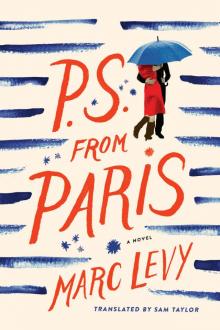 P.S. From Paris (US Edition)
P.S. From Paris (US Edition)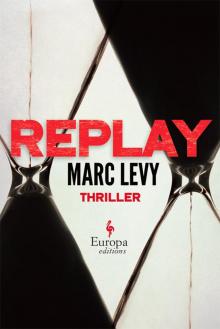 Replay
Replay The Strange Journey of Alice Pendelbury
The Strange Journey of Alice Pendelbury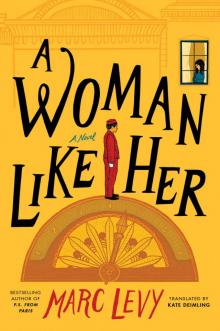 A Woman Like Her
A Woman Like Her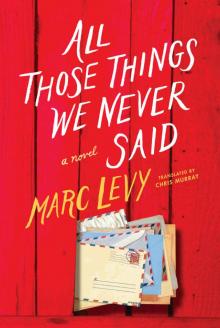 All Those Things We Never Said
All Those Things We Never Said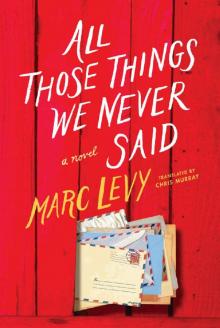 All Those Things We Never Said (US Edition)
All Those Things We Never Said (US Edition)